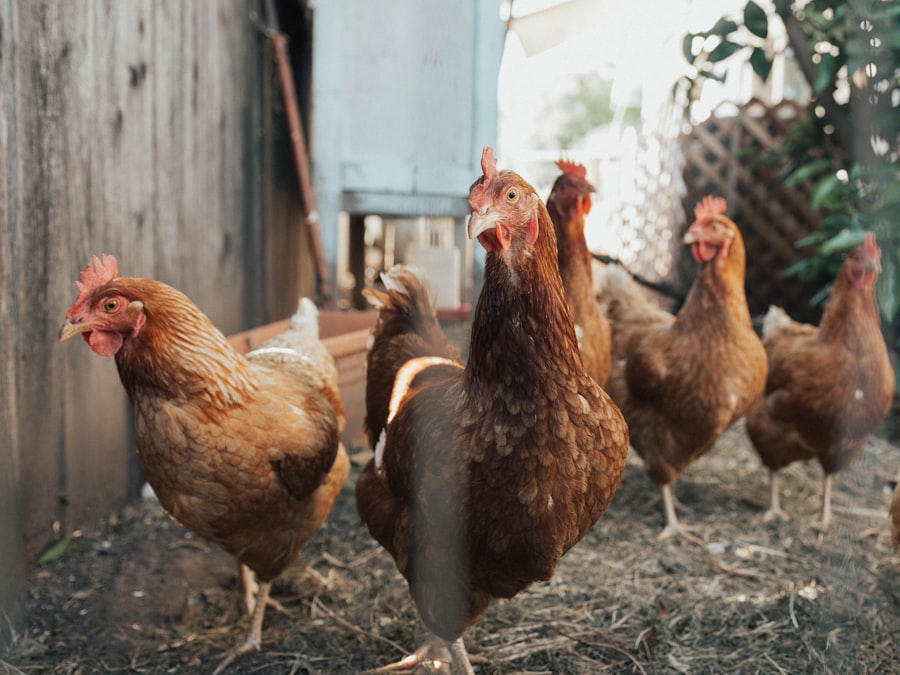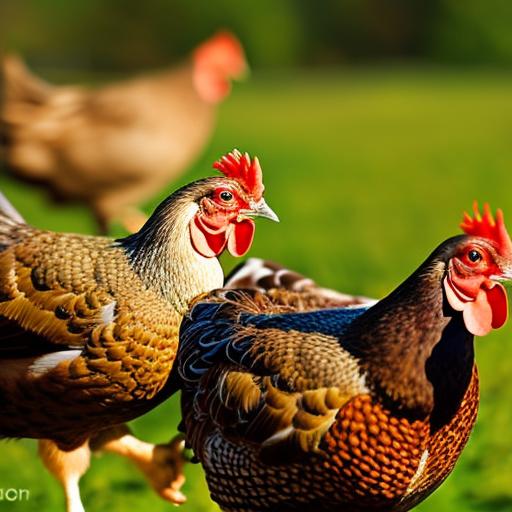Keeping free range chickens has become increasingly popular in recent years, as more and more people are recognizing the benefits of raising their own chickens. Backyard chicken keeping allows individuals to have a sustainable source of fresh eggs and meat, while also enjoying the many other advantages that come with having free range chickens. In this article, we will explore the benefits of keeping free range chickens, discuss how to choose the right chicken breed, provide tips for building a chicken coop, and offer advice on feeding and caring for free range chickens.
Key Takeaways
- Keeping free range chickens provides fresh eggs and meat, natural pest control, and a fun hobby.
- Choose a chicken breed that suits your climate, space, and egg/meat preferences.
- Building a chicken coop requires careful planning, materials, and tools.
- The size and design of your chicken coop should accommodate your flock size, ventilation, and protection from weather and predators.
- Regular maintenance of your chicken coop includes cleaning, disinfecting, and repairing any damages.
Benefits of Keeping Free Range Chickens
One of the main benefits of keeping free range chickens is the nutritional value of their eggs and meat. Free range eggs have been found to be higher in omega-3 fatty acids and vitamin E compared to eggs from caged hens. They also tend to have a richer flavor and brighter yolks. Similarly, free range chicken meat is leaner and has a more robust flavor compared to conventionally raised chicken.
In addition to the nutritional benefits, free range chickens can also help control pests and weeds in the garden. Chickens are natural foragers and will eat insects, slugs, and other pests that can damage plants. They also scratch at the ground, which helps to aerate the soil and control weeds. This can be particularly beneficial for organic gardeners who want to minimize the use of chemical pesticides.
Keeping free range chickens also has environmental benefits. Chickens produce manure, which can be used as a natural fertilizer for gardens. By keeping chickens, you can reduce your reliance on synthetic fertilizers and contribute to a more sustainable agricultural system. Additionally, raising your own chickens reduces the carbon footprint associated with transporting eggs and meat from commercial farms to your local grocery store.
Choosing the Right Chicken Breed
When it comes to choosing the right chicken breed for your backyard, there are several factors to consider. First, you’ll want to think about whether you want chickens primarily for egg production, meat quality, or both. Some breeds are known for their high egg production, while others are bred for their meat quality. There are also dual-purpose breeds that are suitable for both egg and meat production.
Another important consideration is the temperament of the breed. Some breeds are more docile and friendly, making them a good choice for families with children. Other breeds may be more flighty or aggressive, which can make them more challenging to handle. It’s important to choose a breed that matches your lifestyle and preferences.
Some popular chicken breeds for backyard chicken keeping include the Rhode Island Red, the Plymouth Rock, and the Sussex. These breeds are known for their hardiness, good egg production, and friendly temperament. However, there are many other breeds to choose from, so it’s worth doing some research to find the breed that best suits your needs.
Building a Chicken Coop
A chicken coop is essential for keeping free range chickens. It provides shelter and protection from predators, as well as a safe place for chickens to roost and lay eggs. When building a chicken coop, there are several factors to consider.
First, you’ll need to decide on the type of coop you want to build. There are many different designs to choose from, including traditional wooden coops, mobile coops (also known as chicken tractors), and converted sheds or outbuildings. Each type of coop has its pros and cons, so it’s important to consider your specific needs and preferences.
Next, you’ll need to gather the necessary materials and tools for building your coop. This will depend on the design you choose, but common materials include wood, wire mesh, roofing materials, and hardware such as hinges and latches. It’s also important to have the right tools on hand, such as a saw, drill, hammer, and screwdriver.
When designing your chicken coop, it’s important to consider the needs of your chickens. They will need enough space to move around comfortably, as well as nesting boxes for laying eggs and perches for roosting. Ventilation is also important to prevent the buildup of moisture and ammonia from chicken droppings. Additionally, you’ll want to make sure the coop is secure and predator-proof, with sturdy fencing and locks on doors and windows.
Chicken Coop Size and Design
The size of your chicken coop will depend on the number of chickens you plan to keep. As a general rule of thumb, each chicken should have at least 4 square feet of indoor space and 10 square feet of outdoor space. This means that if you plan to keep 6 chickens, your coop should be at least 24 square feet in size.
In addition to size, there are several other design considerations to keep in mind when building a chicken coop. Ventilation is crucial to prevent the buildup of moisture and ammonia, which can lead to respiratory problems in chickens. You can achieve good ventilation by adding windows or vents that can be opened and closed as needed.
Lighting is also important in a chicken coop. Chickens need natural light to lay eggs, so it’s a good idea to include windows or skylights in your coop design. You can also use artificial lighting to supplement natural light during the winter months when daylight hours are shorter.
Insulation is another consideration, especially if you live in an area with extreme temperatures. Insulating your coop can help keep chickens warm in the winter and cool in the summer. This can be achieved by adding insulation panels or using materials such as straw or hay for bedding.
Chicken Coop Maintenance

Regular cleaning and maintenance of your chicken coop is essential for keeping your chickens healthy and preventing the spread of disease. It’s recommended to clean the coop at least once a week, although this may need to be done more frequently if you have a large number of chickens or if the coop becomes particularly dirty.
When cleaning the coop, start by removing all bedding material and any uneaten food. Use a rake or shovel to remove any droppings from the floor and nesting boxes. You can then wash the coop with a mild detergent and water, making sure to scrub all surfaces thoroughly. Rinse the coop with clean water and allow it to dry before adding fresh bedding.
In addition to regular cleaning, it’s important to disinfect the coop periodically to kill any bacteria or parasites that may be present. This can be done using a disinfectant solution or by using natural products such as vinegar or hydrogen peroxide. Make sure to follow the instructions on the disinfectant product and allow the coop to dry completely before reintroducing chickens.
It’s also important to keep an eye out for common chicken health issues and take appropriate action if necessary. This includes checking chickens for signs of illness, such as lethargy, loss of appetite, or abnormal droppings. If you notice any signs of illness, it’s best to consult a veterinarian who specializes in poultry health.
Feeding Free Range Chickens
Feeding free range chickens is relatively straightforward, as they will supplement their diet with insects, worms, grass, and other natural foods found in their environment. However, it’s still important to provide a balanced diet to ensure that chickens are getting all the nutrients they need.
A good quality chicken feed should make up the majority of a free range chicken’s diet. Look for a feed that is specifically formulated for laying hens if you want your chickens to produce eggs. If you’re raising chickens for meat, choose a feed that is higher in protein to promote healthy growth.
In addition to feed, you can also provide your chickens with kitchen scraps and garden waste. Chickens will happily eat fruit and vegetable scraps, as well as weeds and grass clippings. Just make sure to avoid feeding them anything that is toxic to chickens, such as onions, garlic, or avocado.
Supplements can also be beneficial for free range chickens. Calcium is particularly important for laying hens, as it helps to form strong eggshells. You can provide calcium in the form of crushed oyster shells or eggshells. Grit is another important supplement, as it helps chickens to digest their food by grinding it in their gizzard.
Providing Water for Free Range Chickens
Clean and fresh water is essential for the health and well-being of free range chickens. Chickens need access to water at all times, so it’s important to provide a reliable source of water in their environment.
There are several options for providing water to free range chickens. One option is to use a traditional waterer, which is a container with a small opening that allows chickens to drink without spilling the water. Another option is to use a nipple waterer, which is a device that attaches to a water source and releases water when chickens peck at it.
It’s important to regularly check and clean the waterer to ensure that the water is clean and free from contaminants. Chickens can be messy drinkers, so it’s not uncommon for the waterer to become dirty or clogged with debris. Make sure to clean the waterer regularly and replace the water if it becomes contaminated.
During the winter months, it’s important to prevent the water from freezing. This can be achieved by using a heated waterer or by regularly replacing the water with fresh, unfrozen water. It’s also a good idea to insulate the waterer or place it in a sheltered area to help prevent freezing.
Protecting Free Range Chickens from Predators
One of the biggest challenges of keeping free range chickens is protecting them from predators. There are many animals that pose a threat to chickens, including raccoons, foxes, coyotes, and birds of prey. It’s important to take steps to deter predators and ensure the safety of your chickens.
One of the most effective ways to protect chickens from predators is to use fencing. A sturdy fence that is at least 6 feet tall and buried at least 12 inches into the ground can help keep out most predators. Make sure to regularly inspect the fence for any signs of damage or weakness, and repair any issues immediately.
In addition to fencing, it’s important to design your chicken coop in a way that deters predators. This includes using secure locks on doors and windows, as well as adding wire mesh or hardware cloth to windows and ventilation openings. You can also install motion-activated lights or alarms to scare away predators.
If you do encounter a predator attack, it’s important to act quickly to protect your chickens. Make loud noises or use a flashlight to scare away the predator. If necessary, you can also use a water hose or air horn to deter the predator. It’s important to remember that your safety should always come first, so never put yourself in harm’s way when dealing with a predator.
Health and Safety Considerations for Free Range Chickens
Keeping free range chickens comes with certain health and safety considerations that are important to keep in mind. Good hygiene and biosecurity practices are essential for preventing the spread of disease and ensuring the health of your flock.
One of the most important aspects of good hygiene is keeping the coop clean and free from waste buildup. Regular cleaning and disinfection of the coop will help prevent the spread of bacteria and parasites. It’s also important to practice good hand hygiene when handling chickens or their eggs, as some bacteria can be transmitted to humans.
Another important aspect of biosecurity is preventing contact between your chickens and wild birds or other poultry. Wild birds can carry diseases such as avian influenza, which can be transmitted to chickens. It’s important to keep your chickens in a secure area and prevent contact with wild birds or other poultry.
It’s also important to monitor your chickens for signs of illness and take appropriate action if necessary. Common chicken health issues include respiratory infections, parasites, and nutritional deficiencies. If you notice any signs of illness, it’s best to consult a veterinarian who specializes in poultry health.
Keeping free range chickens can be a rewarding and fulfilling experience. Not only do you get to enjoy fresh eggs and meat, but you also have the satisfaction of knowing that your chickens are living a happy and healthy life. By choosing the right chicken breed, building a suitable coop, and providing proper care and nutrition, you can create a thriving flock of free range chickens in your own backyard. So why not give it a try? With a little bit of planning and preparation, you can enjoy all the benefits that come with keeping free range chickens.
Additional Resources:
– Backyard Chickens: A Practical Handbook to Raising Chickens by Dave Ingham
– The Chicken Health Handbook by Gail Damerow
– Storey’s Guide to Raising Chickens by Gail Damerow are two highly recommended books for anyone interested in raising healthy and happy chickens. The Chicken Health Handbook provides comprehensive information on how to prevent and treat common chicken illnesses and injuries, as well as tips on maintaining a clean and safe coop environment. It also includes a guide to identifying symptoms and administering appropriate treatments. On the other hand, Storey’s Guide to Raising Chickens offers a complete guide to all aspects of chicken care, from selecting the right breed to building a suitable coop and providing proper nutrition. It covers topics such as egg production, brooding, and raising chicks, making it an invaluable resource for both beginners and experienced chicken keepers. Both books are written by Gail Damerow, a renowned expert in poultry care, and are highly regarded for their practical advice and easy-to-understand language. Whether you are a backyard chicken enthusiast or a commercial farmer, these books are essential references that will help you raise healthy and productive chickens.
If you’re interested in keeping free range chickens, you may also find this article on large chicken coop ideas from Poultry Wizard helpful. It provides creative and practical suggestions for designing a spacious and comfortable coop that allows your chickens to roam freely while still providing them with adequate shelter and protection. Check it out here. Additionally, if you’re concerned about keeping your chickens warm during colder months, Poultry Wizard offers an informative article on choosing the right heater for a chicken coop. Find out more here. Lastly, if you’re not ready to commit to building your own coop, Poultry Wizard also provides information on renting a chicken coop. Discover the benefits and considerations of this option here.
FAQs
What are free range chickens?
Free range chickens are chickens that are allowed to roam freely outdoors, rather than being confined to a small space or cage.
Why should I keep free range chickens?
Keeping free range chickens can have several benefits, including providing fresh eggs, natural pest control, and fertilizer for your garden.
What do free range chickens need?
Free range chickens need access to a safe and secure outdoor area, shelter from the elements, fresh water, and a balanced diet.
How do I keep my free range chickens safe?
To keep your free range chickens safe, you should provide a secure coop for them to sleep in at night, protect them from predators such as foxes and hawks, and regularly check for signs of illness or injury.
What should I feed my free range chickens?
Free range chickens should be fed a balanced diet that includes a mix of grains, protein, and fresh fruits and vegetables. You can also supplement their diet with kitchen scraps and other treats.
How do I care for my free range chickens in the winter?
In the winter, you should provide your free range chickens with a warm and dry shelter, access to fresh water that won’t freeze, and a diet that includes extra protein to help keep them warm. You should also check for signs of frostbite and other cold-related health issues.
Meet Walter, the feathered-friend fanatic of Florida! Nestled in the sunshine state, Walter struts through life with his feathered companions, clucking his way to happiness. With a coop that’s fancier than a five-star hotel, he’s the Don Juan of the chicken world. When he’s not teaching his hens to do the cha-cha, you’ll find him in a heated debate with his prized rooster, Sir Clucks-a-Lot. Walter’s poultry passion is no yolk; he’s the sunny-side-up guy you never knew you needed in your flock of friends!







